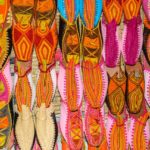Imposter Syndrome: The Story of a PhD Student in Australia
One Monday night, my friend Rebecca and I watched the movie Inception at the local theatre across from the University of Adelaide. I entered, pleased to receive a student-discounted ticket, and I exited, feeling as though I must be in a dream myself.
Here I was in Australia, a place I had never planned on even visiting, walking home through the deserted open-air mall in the city centre. I was doing a PhD in a discipline in which I had no real experience, for which I had won a suspiciously fortuitous scholarship complete with healthcare and one thousand dollars up front to take care of some of my moving costs. All this couldn’t be real. Would I wake up at any moment back in my dingy Boston apartment?
I started to believe that I didn’t deserve my good fortune. I feared that any day now my supervisor or colleagues would find out that I wasn’t actually suited for this PhD business. I came from a creative writing background. During my MFA, I’d always felt decidedly unscholarly next to the literature students I took classes with. I was the artsy fartsy writer and they were the serious literary critics. My presence in their courses was amusingly tolerated. Were my new PhD colleagues just humoring me as well?
All this couldn’t be real. Would I wake up at any moment back in my dingy Boston apartment?
In the month since my arrival, I had developed a bad case of imposter syndrome.
There were other woes. My PhD project involved extended travel, which meant that I needed to drum up travel grants and fellowships, something my colleagues didn’t have to worry about. Their projects kept them right here in Adelaide. I wished I had proposed a different topic, one where the only research required was a trip to the library, instead of getting myself to the Arabian Gulf to interview strangers. That place, once my home, suddenly seemed so far. I quickly realized that I wouldn’t have the time, money or capacity to coordinate research in Kuwait, Qatar and the UAE. I would have to stick to the city I knew: Dubai. Deciding to limit my research plans was a relief, since I would have less logistical concerns, but also a disappointment, as I had wanted the time and support to find out what the young local women of those cities had to say.
My choice to study in Australia put me in a gray area in terms of funding. Often, grants and fellowships in Australia were for Australian citizens, and those in America were for students residing in America. That left only a few I was actually eligible for. I applied for the big social science grants, ones with a 10-20 percent success rate, and was unsurprisingly knocked back. How was I going to get myself to Dubai and stay there for six months on my PhD scholarship, which was a living allowance, not meant for study-related travel? I contacted an old boyfriend in Dubai to ask if he knew of any short-term places to rent in Dubai and how much they might cost. He immediately replied that I should stay with him in his one-bedroom apartment. That was not what I had in mind.
Meanwhile, lots of reading. Each morning, I walked briskly to my shared office, printed off as many relevant articles as I could carry, and read them in the library, in a café, and then back home, lying on my bed before sleep. Deciphering academic articles and books was like learning another language. Once again, I felt ill prepared, questioning my hasty decision to apply for this impossible PhD project, and the poor foresight of the University of Adelaide for accepting someone so inadequately equipped for the task.
Yet, I read on, and gradually, this new way of expressing ideas became easier to grasp. I read about anthropological methods; ethnographies by new heroes who spent time with women in Lebanon, Cairo, and Lahore; histories of the UAE and Gulf region; and of course, post-structural feminist theory. That final one is a doozy. More and more, I found I could get myself into a zone of deep understanding, only to have all that hard-won comprehension unravel as I walked the twenty minutes home to my little basement room. I was afraid to read any novels for fear that my growing proficiency in academic reading would disappear, or that I would become so enthralled that I wouldn’t be able to stand my dull life’s work any longer.
Like most new PhD students in the Australian system, I felt slightly adrift. There were no classes to ground me, no community or common experience to truly draw on. The other PhD students I met were lovely, but our topics couldn’t have been more different, giving us little to talk about in terms of our actual day-to-day scholarship. Our supervisors guided us, but the brunt of the work—from placing our projects within the wider field of study to designing how we would go about getting our research questions answered—was on our individual shoulders.
After several months of anxiety, suddenly, a few things worked out for me. Only through my sister’s contacts did I learn about and finally win a Religious Studies fellowship to Gada Maja University in Yogyakarta, Indonesia. It was a circuitous route to Dubai, but the fellowship would pay for my flight to Indonesia and then, once the two-month fellowship was over, onward to Dubai. Plus, by living in university-provided housing in Yogyakarta for two months, I’d be saving a lot of money. It wasn’t winning a major, impressive grant, but it was still an excellent turnout. Months earlier, I had written to a former colleague in Dubai for her advice on where to stay. Out of the blue, she returned my email and offered me a place to stay in her two-bedroom on-campus apartment. Perri was my favorite colleague back in Dubai, and I was elated with the chance to spend more time with her, and know that I would actually have somewhere to live.
Logistically, I was all set to head back to Dubai. I just had to find young Emirati women who were willing to talk to me. But it would all work out once I was there, in the action, wouldn’t it? It would just have to. And unlike the last time I headed to the UAE, this time I had an exit; at the end of six months there, I would be returning to Adelaide. As I had fretted about the future, I barely noticed how well I had settled into Adelaide life: shopping at the Central Markets, watching Australian TV dramas, falling in love with Australian music (ahem, Missy Higgins and Powder Finger), hanging out with Rebecca and her science friends, and taking long walks around the city.
I was doing a PhD in a discipline in which I had no real experience, for which I had won a suspiciously fortuitous scholarship complete with healthcare and one thousand dollars up front to take care of some of my moving costs.
There was just one thing I had to do: get my travel memoir published, the one I had written back in America. I had been relieved to forget about it for a while, ignoring the fact that I sacrificed a year of work and earning money to write this book, and then spent another year trying to get it published. I was hurt that American agents and publishers seemed so disinterested in life in Abu Dhabi and Dubai. But perhaps Australians would think differently. I had my pitch letters all ready to go, so I spent a few weekends emailing Australian agents about Abu Dhabi Days, Dubai Nights. I didn’t hold out much hope, and that was a good thing. Now that I had my PhD to focus on, failing to publish my travel memoir wasn’t the only thing that defined me professionally. I sent out those emails on a calculated whim, and tried to forget about them.
One Sunday evening, I walked home through the city, and once again, was reminded of Inception. My life had mysteriously gone from a bundle of worry to everything falling into place. All the frustration of my life back in Boston, and the anxiety from the first few months of my PhD melted away. This wasn’t a dream. This was my new reality. How long would it last?
Photo credit: Les Haines









Practically my life, from 2009, as well! Substitute Adelaide for Canberra and the UAE for India, but the imposter syndrome was the same for me, too 🙂 But it all worked out in the end, I gained confidence as I’m sure you did too.